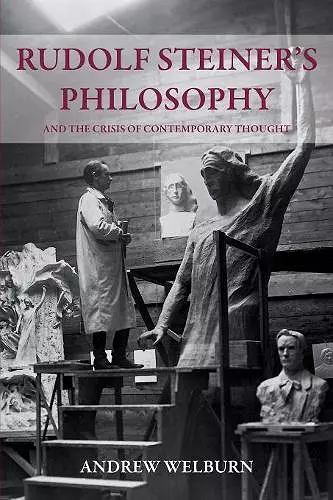Rudolf Steiner's Philosophy
And the Crisis of Contemporary Thought
Format:Paperback
Publisher:Floris Books
Published:7th Jul '11
Currently unavailable, and unfortunately no date known when it will be back

-- A ground-breaking exploration of Steiner's thought
-- One of the most important philosophers of the last 150 years
-- Vast legacy of practical work with world-wide supporters
The Austrian-born philosopher Rudolf Steiner (1861-1925) created a vast legacy of practical work in Waldorf education, biodynamic agriculture, Camphill communities for adults and children with special needs, as well as in many other artistic and scientific areas.
The foundation of all these approaches is a highly developed system of thought with which Steiner addressed philosophical issues. Many of these issues were also tackled by a number of contemporaries, notably the phenomenological school represented by Edmund Husserl and others.
Seeking to clarify his moral thinking which he termed 'ethical individualism', Steiner offered a challenging view of knowledge, not as an abstract and objectified reality, but as a form of relationship between the knower and the known. By this measure, all genuine knowledge is experiential and thus intimately involved with, and capable of changing, the world. Equally, there is no world 'out there', since every individual is a participant in reality, and there are no morally neutral acts or thoughts.
Andrew Welburn presents a fascinating insight into the radical nature of Steiner's thinking. Welburn examines his inheritance of ideas from Johann Wolfgang von Goethe, his attempt to break out of Cartesian dualism and Kantian idealism, and his challenge to the conventional framework of European philosophy.
'This is a valuable book, not just for persons interested in the thought of Rudolf Steiner. It is valuable as well for anyone seeking to find a way forward amidst the shattered fragments of the modern worldview. Uncannily, according to Welburn's account, Steiner anticipated the crisis associated with post-modernity we have been facing and proposed an innovative, constructive way forward.'
-- Dale Cannon, Appraisal: the Journal of the Society for Post-Critical and Personalist Studies, March 2005
'Armchair philosophers will enjoy reading this with nothing stronger than a mild herb tea to keep them awake. What really makes this book relevant and exciting is its subject. Much of this book is about knowledge, what it is, how we achieve it and above all, how knowledge acquires meaning. This book is an excellent guide.'
-- Martyn Rawson, Steiner Education, June 2004
'It would be useful to have a new edition of Steiner's The Philosophy of Freedom set in the context of contemporary philosophy. Until that happens, Welburn's contribution provides an excellent alternative. [...] Welburn covers the whole breadth of Steiner's philosophical thinking and in doing so relates it to contemporary philosophy and ethics, including the work of several philosophers alive today. I was favourably impressed by how naturally the author leads the reader, almost unawares, over the boundary from philosophy to anthroposophy and the occult. [...] Should interest scientists as well as those more generally interested in Steiner's thinking.'
David Heaf, New View, Spring 2004
ISBN: 9780863158568
Dimensions: unknown
Weight: 408g
288 pages